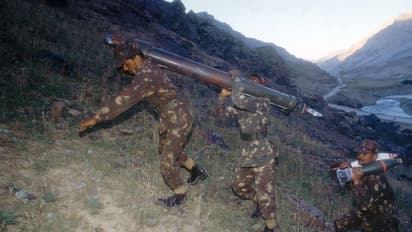Pakistan's MASSIVE admission: Army officially accepts role in 1999 Kargil war for 1st time in 25 years (WATCH)

Synopsis
In a historic admission, Pakistan Army Chief General Asim Munir on Saturday officially confirmed the Pakistan Army's involvement in the 1999 Kargil War with India.
In a historic admission, Pakistan Army Chief General Asim Munir on Saturday officially confirmed the Pakistan Army's involvement in the 1999 Kargil War with India, a revelation that marks the first time the Pakistani military has publicly acknowledged its direct role in the conflict. The statement was made during a speech on Defence Day, a significant occasion in Pakistan's military calendar.
Until now, the Pakistani military had consistently denied direct participation in the Kargil War, which took place between May and July 1999 in the Kargil district of Jammu and Kashmir. The official narrative from Islamabad during the conflict described the infiltrators as "Kashmiri freedom fighters" or "mujahideen," and claimed that Pakistani forces were merely "actively patrolling" while "tribal leaders" occupied the strategic heights. The revelation by General Munir is thus a major shift in the official stance.
Also read: Amit Shah promises to restore J&K statehood post elections, slams Congress, NC
In his speech, General Munir referred to various conflicts involving Pakistan, stating, "1948, 1965, 1971 or Kargil war between India and Pakistan, or Siachen, many have sacrificed themselves in them." This acknowledgment comes nearly 25 years after the Kargil conflict, a period during which Pakistan's denial of its direct military role had been a subject of international scrutiny and controversy.
The Kargil War was initiated by Pakistani troops and militants infiltrating Indian territory, aiming to capture strategic positions in the Kargil district. The conflict ended with a decisive victory for India, and the withdrawal of Pakistani forces from the region. At the time, the international community, including the United States and other key players, criticized Pakistan for its role in the conflict.
Former Indian High Commissioner to Pakistan, Ajay Bisaria, commented on the development in an interview with WION, saying, "It is well accepted that the Kargil misadventure did not help Pakistan and was Musharraf’s folly, executed by him and a cabal of four generals. Nawaz Sharif has openly criticised it." Bisaria’s remarks underline the long-held belief among Indian officials that the Kargil operation was a miscalculation by then-Pakistani military leaders.
While this is the first time the Pakistani military has publicly confirmed its involvement, some former officials had previously admitted the role of regular Pakistani troops in Kargil. Notably, Lt Gen (retd) Shahid Aziz, after his retirement, disclosed the involvement of Pakistani regulars in the conflict. Aziz described the Kargil operation as a "four-man show," kept secret from other military commanders. The key figures involved, according to Aziz, were Gen Pervez Musharraf, chief of general staff Lt Gen Mohammad Aziz, FCNA (Force Command Northern Areas) commander Lt Gen Javed Hassan, and 10-Corps commander Lt Gen Mahmud Ahmad.
The admission by General Munir also highlights the ongoing debate within Pakistan about the Kargil War. Nawaz Sharif, who was Pakistan's Prime Minister during the conflict, has acknowledged the country's role after leaving office. Sharif acknowledged that Pakistan breached the 1999 Lahore Declaration, which he had signed alongside Indian Prime Minister Atal Bihari Vajpayee. This acknowledgment further complicates the legacy of the Kargil War and reflects the internal political and military complexities surrounding the issue.
The direct involvement of Pakistani forces in the Kargil War has been well-documented in various accounts and scholarly works. For instance, Naseem Zehra's book, based on interviews with Pakistani generals, has detailed the military’s role in the conflict. Such accounts, alongside the recent confirmation by General Munir, contribute to a more comprehensive understanding of the Kargil War and its ramifications.
General Asim Munir's confirmation of Pakistan's military involvement in the Kargil War represents a significant shift in the official narrative. It not only brings closure to decades of speculation and debate but also underscores the complexities of the Indo-Pakistan relationship and the enduring impact of historical conflicts on contemporary geopolitics.
Stay updated with the Breaking News Today and Latest News from across India and around the world. Get real-time updates, in-depth analysis, and comprehensive coverage of India News, World News, Indian Defence News, Kerala News, and Karnataka News. From politics to current affairs, follow every major story as it unfolds. Get real-time updates from IMD on major cities weather forecasts, including Rain alerts, Cyclone warnings, and temperature trends. Download the Asianet News Official App from the Android Play Store and iPhone App Store for accurate and timely news updates anytime, anywhere.